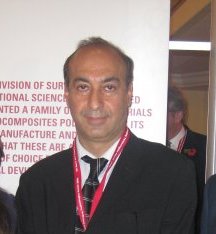Professor Alexander M. Seifalian
The Singularity Hub article Nanotechnology Creates Artificial Artery for Clinical Trials said
“Researchers at London Royal Free Hospital are hoping to save limbs and lives with the creation of their new artificial artery. Unlike current artery replacements, this grafting substance was created using nanotechnology and can pulse with the natural movements of the body. That pulsing will allow the polymer tube to be used in very small grafts (<8mm), giving hope that damaged arteries which would normally lead to amputations or heart attacks can now be treated. According to a recent press release, the Wellcome Trust has given [L]$500,000 to begin clinical trials of the new artificial arteries by the end of 2010. We could see the new polymer arteries in grafts, stints, and other vascular surgeries in the next few years.The new artificial artery material was developed by Professors George Hamilton (vascular surgery) and Alexander Seifalian (nanotechnology and tissue repair). The substance is a polymer which has been embedded with different types of special molecules. Some of these molecules aid circulation, others encourage stem cells to coat its walls. That coating is very important and may allow the artificial tissue to bond better with the body and promote long term health. Most importantly though, the design of the artificial vascular tissue is resistant to clotting and can pulse.”
Alexander M. Seifalian, Ph.D. is Professor of Nanotechnology & Regenerative Medicine, UCL Division of Surgery & Interventional Science, University College London, Royal Free Hampstead NHS Trust Hospital. His research interests include development of organs using nanomaterials and stem cell technology.
Alex coauthored A review of the carotid and femoral intima-media thickness as an indicator of the presence of peripheral vascular disease and cardiovascular risk factors, Development of a hybrid cardiovascular graft using a tissue engineering approach, Protection of the Liver by Ischemic Preconditioning: A Review of Mechanisms and Clinical Applications, The Contemporary Role of Antioxidant Therapy in Attenuating Liver Ischemia-Reperfusion Injury: A Review, Impaired Carotid Viscoelastic Properties in Women With Polycystic Ovaries, Advancing vascular tissue engineering: the role of stem cell technology, and The relationship of hepatic tissue oxygenation with nitric oxide metabolism in ischemic preconditioning of the liver. Read the full list of his publications!
Alex earned his B.Sc., M.Sc., and Ph.D. degrees from the University of London, London, U.K.
Visit his Facebook page and his LinkedIn profile. Read Royal Free team to trial artificial artery in patients.
